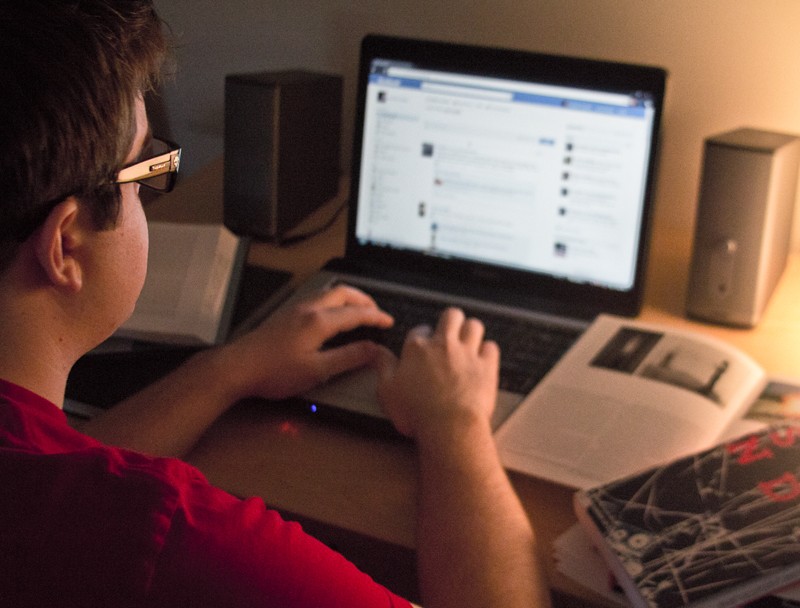Students struggle with distractions

GVL / Dylan Graham Facebook and internet distract many students from studying.
Feb 13, 2012
Between social lives, clubs, classes and other activities, multitasking is seen as an inescapable part of the college experience, but studies show these distractions can translate to a poorer academic
performance.
“Studying effectively requires not only sustained attention, but connecting information across time, pulling information from different sources and integrating it together, and thinking about the implications and applications of basic information,” said Michael Wolfe, a psychology professor at Grand Valley State University. “When a student constantly interrupts his or her studying to check Facebook or to text, attention is interrupted. The interruptions make it harder to concentrate on the tasks that require focus over a sustained period of time.”
Wolfe said the anticipation of getting messages in these media can distract you even if you aren’t actually using them at a given moment.
Many students may consider the time spent being distracted as a break from their studies, and Wolfe said breaks are beneficial.
“Breaks are essential during study,” Wolfe said. “But you should concentrate on studying for a period of time, and then take a break for a little while. Texting and Facebooking while you’re in the middle of studying are distractions, not breaks.”
Junior Emily Brzezicki agreed with Wolfe, but said it depends on the type of studying being done, how long the homework has been worked on and how long the distraction takes.
“If I am studying for an exam, especially anything chemistry- or biology-related, I tend to just get stressed out without realizing it, so it helps to watch a YouTube video or check Facebook or Twitter then go back to (studying),” Brzezicki said. “… When I spend more than two to five minutes on a distraction, it is too much of a distraction and not enough productivity.”
According to a study by Virginia Technical Institute, 50 to 90 minutes of study at a time with relaxation periods of 10 to 15 minutes long is the more efficient way to study.
Junior Colleen Condra, a resident assistant and facilitator on campus, said she tries to get all distractions, including Facebook, Tumblr, email and talking to people, taken care of before starting homework so she is not thinking about anything but the topic at hand.
“I can’t begin my homework before I check the sites because if I don’t check them beforehand, it will be on mind while I am trying to study which is more distracting in the long run,” Condra said.
However, she said she still takes some breaks as she works.
“Out of an hour’s worth of study time, if I can maintain focus on my studies for three quarters of the time, I denote that as successful,” she said.
Wolfe said he thinks it doesn’t make sense that students need a distraction to get them back on track.
“If you are using the distractions as your study break, then it’s fine,” he said. “But the break will be the thing that helps you come back and focus, not the distraction itself.”
Many times sociological and technological factors combined distract college students.
Brzezicki said she feels the need to be constantly checking her phone because she is so far away from home.
“I am more likely to receive a text or phone call if it is attached to my hip,” she said. “I tend to check my phone a lot in general even when I am not studying.”
Condra said some students must constantly be hooked into distractions like the Internet for employment reasons.
“I think that it has been ingrained in me to continually check those things especially as a facilitator on campus and a resident assistant,” she said. “It is necessary to stay updated and in the know of what is going on around us. If you are talking about email and Facebook, then college is not just about learning. In the long run to get a job you need more than just the ability to regurgitate information, you need personal connections to be successful.”
Wolfe said many students may believe that, because distractions are part of their everyday life, they can effectively deal with them while maintaining their studies.
“Many students believe that they are ‘good’ at using these distractions while they study because they do it all the time,” he said. “They aren’t. You can’t become good at studying while texting, just like you can’t become good at texting and driving, or talking on the phone and driving.”
Wolfe said turning off the devices or exiting out of the web browser is the easiest way for students to remain focused. He also suggested taking a walk outside because studies have shown that nature can help refocus the mind.























